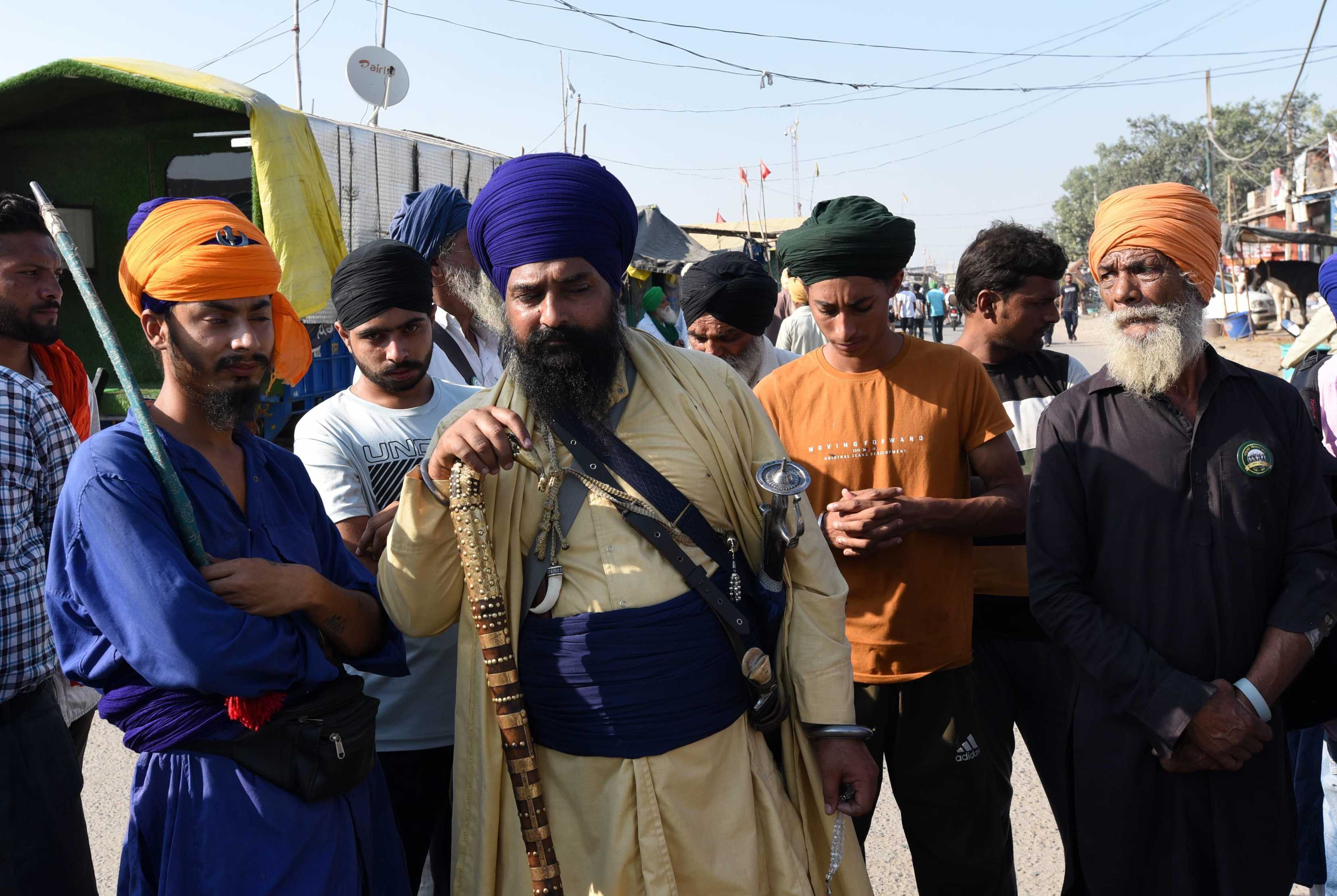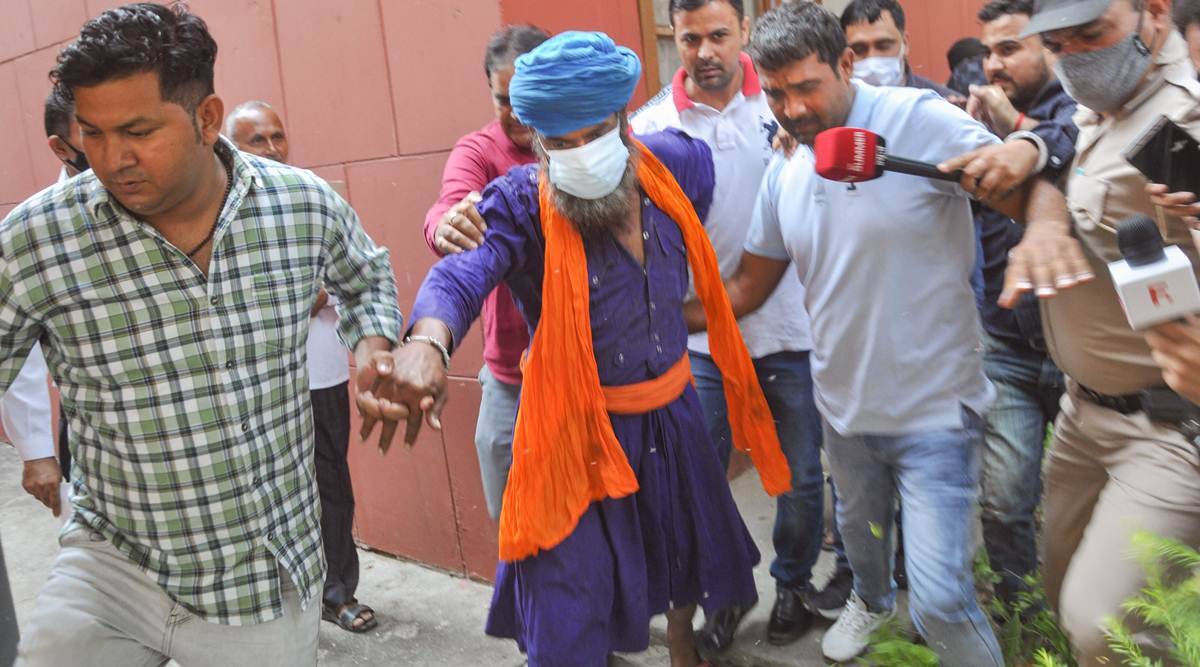
The petrifying lynching incident at Singhu border has bared the fault lines of the farmers’ protest – which is on for about a year against the three contentious farm laws – besides blurring the stir’s focus yet once again.
The indefensible lynching of Lakhbir Singh of Punjab’s Tarn Taran area, bang under the sky at the Singhu border dharna site, by a group of Nihangs has left the country appalled. Lakhbir was lynched and strung up on October 15 last, at the said site. He was accused of desecrating a holy book of Sikhs.
The next day, the videos showing the barbaric act went viral all over in which a group of Nihangs who were part of the protesters at Singhu, claimed responsibility for the lynching. They said that the man had disrespected the holy book.
The incident evoked hardly any reactions from political leaders for the very issue being that of sacrilege. The issue pertaining to the sacrilege that took place in 2015 when the Akali Dal-BJP had a coalition government in Punjab, had engulfed the political landscape of the state to such an extent that a person belonging to the lowest economic and social strata meeting a painful end found no support for the very reason of the charges he faced.
The farmers’ fora too went into huddle and seemed to have hardly any reaction to offer.
The Bharatiya Kisan Union (BKU) leader Rakesh Tikait termed the incident as a religious matter and that it had no connection with the farmers’ stir. According to media reports, Tikait while quoting Nihangs as having said it, held that even they had asked the government not to link it to the farmers’ stir. He went on to allege a conspiracy of government behind the incident and sought the government to ensure that the situation did not deteriorate further.
Punjab deputy chief minister Sukhjinder Singh Randhwa was among the firsts to demand a probe into the incident and he held that it was required to identify elements trying to incite religious sentiments and defame farm stir. The Akali Dal and the Shiromani Gurdwara Parbandhak Committee (SGPC) flayed the incident and sought a probe.
Meanwhile, a few Nihangs allegedly involved in the lynching were held by the Haryana police which has also set up special investigation team to probe the incident.
Conspiracy angle

Meanwhile, the photos of Nihang leader Baba Aman Singh – whose group was involved in the lynching at Singhu border – meeting with top BJP leaders which came out in media, have added a twist to the incident. It has also pushed the Punjab BJP leaders who had until recently been vehemently flaying the lynching, on the back-foot.
The Nihang leader, Baba Aman Singh is also reported to have admitted that he met Union agriculture minister Narendra Singh Tomar and others and that a BJP leader had offered Rs 10 lakh in cash, besides some horses for vacating the Singhu dharna site, but he had declined.
The Nihang leader, however, also held that they would lift the dharna only after the contentious farm laws were withdrawn, the continuance of the MSP system was assured and the justice was done in the sacrilege incidents.
Surprisingly enough, the BJP leadership has remained tight-lipped over the said meetings with Nihang leader Baba Aman Singh.
SKM for probe by SC judge, resignation by Tomar
Meanwhile, the farmers’ body – Samyukta Kisan Morcha (SKM) has demanded the incident to be investigated by a Supreme Court judge, and the resignation of Union Ministers Narendra Singh Tomar and Kailash Chaudhary who were seen in pictures to have met the Nihang Sikh leader whose group is involved in the brutal murder.
The SKM clarified “strongly that there is no space in the Singhu Border morcha or any other morcha for the accused groups and communes in this murder’’.
Stating that it strongly condemned the violent incident of October 15 at Singhu border morcha, the SKM statement said that it was clear this was a conspiracy to give a bad name to the farmers’ movement and to entrap it in violence. “SKM has already clarified that the morcha has nothing to do with the Nihang Sikhs involved in this incident. SKM would now like to clarify strongly that there is no space in the Singhu Border morcha or any other morcha for the accused groups and communes in this murder. This is a farmers’ movement and not a religious movement’’, the statement further said.
The SKM has also formed a five-member committee to submit a fact-finding report of the incident.
In another development, the SKM leader Yogendra Yadav was suspended for a month for visiting the family of a BJP worker who was killed in Lakhimpur Kheri violence, to share their grief.
Don’t blame it on farmers’ stir: Experts
Recalling different unlawful incidents during the ongoing stir, experts have, however, sought to view Singhu lynching in a neutral perspective, instead of holding farmers’ protest responsible for it.
Admitting that it was unfortunate, political observer Dr Rajender Sharma, who teaches at the department of political science, Maharshi Dayanand University (MDU), Rohtak, held that the sacrilege issue is a burning issue in Punjab. He also agrees that lynching was not the first crime that had taken place during the stir. Besides the rampage on Republic Day, rape of a woman was reported and a man was also charged to death in the past.
Agreeing that it was sad to have such crimes in society, Dr Sharma said that these incidents had to be understood in a neutral perspective as such crimes were also reported at different places in the past too. Agreeing that such incidents had had a negative impact on this farmers’ agitation, he, however, held that such incidents should not be linked with the farmers’ agitation as the reason behind such incidents is not the agitation itself but social and cultural degeneration.
The agitation is against the three farm laws supported by different sections of society. Blaming the agitation for all such unsavory incidents is not justified, Dr Sharma added.













